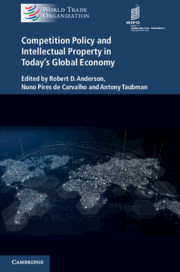Book contents
- Frontmatter
- Contents
- Tables
- Figures
- Boxes
- Contributors
- Preface
- Editorial Note
- 1 Introduction: Towards a Fresh Contribution to a Critical Policy Dialogue
- Part I Setting the Scene: Evolution of Key Principles and International Dialogue
- Part II Sharpening the Focus: Sectoral Perspectives
- Part III Deepening the Dialogue: Comparative and Jurisdictional Analyses
- Part IV Drawing the Lessons: Towards International Policy Coherence
- Index
20 - Reverse Patent Settlement Agreements in the Pharmaceutical Sector: Enforcement and Regulatory Issues in a Comparative Perspective
from Part III - Deepening the Dialogue: Comparative and Jurisdictional Analyses
Published online by Cambridge University Press: 04 June 2021
- Frontmatter
- Contents
- Tables
- Figures
- Boxes
- Contributors
- Preface
- Editorial Note
- 1 Introduction: Towards a Fresh Contribution to a Critical Policy Dialogue
- Part I Setting the Scene: Evolution of Key Principles and International Dialogue
- Part II Sharpening the Focus: Sectoral Perspectives
- Part III Deepening the Dialogue: Comparative and Jurisdictional Analyses
- Part IV Drawing the Lessons: Towards International Policy Coherence
- Index
Summary
Patents are of crucial importance in the pharmaceutical sector, to ensure adequate levels of return on investment in research and development (R&D) leading to the invention, regulatory approval and successful marketing of beneficial new medicines and other drugs. At the same time, pharmaceutical patents may have a greater impact than those in other economic sectors on competition, pricing and resource allocation. In contrast to the impact of patents in other areas, a patent on a pharmaceutical compound or formulation will often result in a true monopoly, in the economic sense, on the supply of drugs for the treatment of particular medical conditions, as suitable alternative treatments are not always available.
- Type
- Chapter
- Information
- Publisher: Cambridge University PressPrint publication year: 2021

